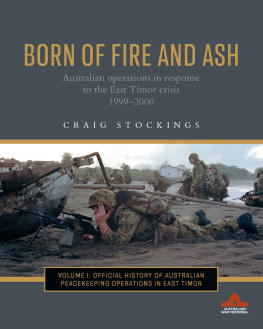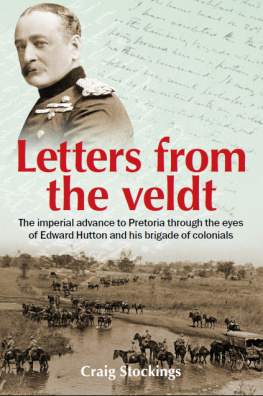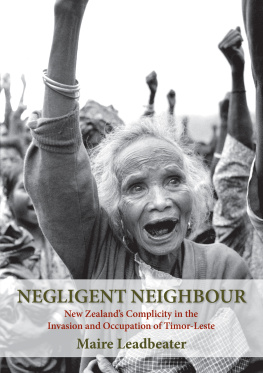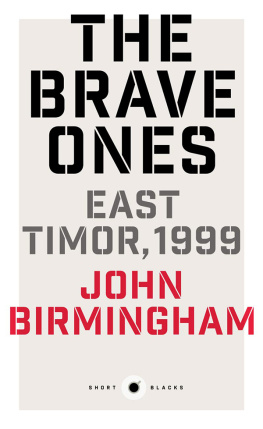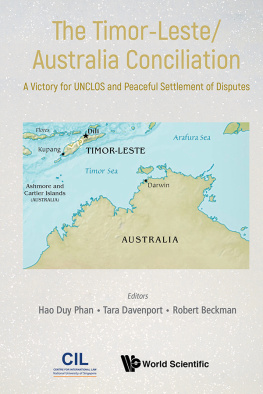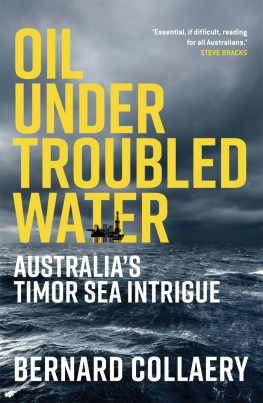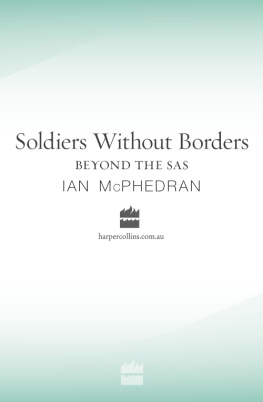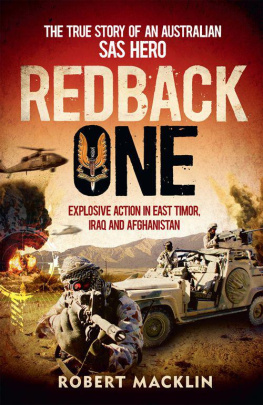Contents
Page List
Guide

BORN OF FIRE AND ASH
Disclaimer
The Australian Government has provided access to all relevant government records to Professor Craig Stockings and his research team for the purposes of writing the Official History of Australian Operations in Iraq and Afghanistan, and Australian Peacekeeping Operations in East Timor. In keeping with the customary independence of Australian Official Histories, the authors alone are responsible for the interpretations in this volume and for any errors that might be found.
A UNSW Press book
Published by
NewSouth Publishing
University of New South Wales Press Ltd
University of New South Wales
Sydney NSW 2052
AUSTRALIA
https://unsw.press/
Craig Stockings 2022
First published 2022
10 9 8 7 6 5 4 3 2 1
This book is copyright. Apart from any fair dealing for the purpose of private study, research, criticism or review, as permitted under the Copyright Act, no part of this book may be reproduced by any process without written permission. Inquiries should be addressed to the publisher.
 | A catalogue record for this book is available from the National Library of Australia |
| ISBN: | 9781742236230 (hardback) |
| 9781742238456 (ebook) |
| 9781742239354 (ePDF) |
Design Josephine Pajor-Markus
Cover design Luke Causby
Cover image INTERFET troops take up positions on the Suai shoreline / W. Guthrie, Defence images, V9910029
Printer Everbest
All reasonable efforts were taken to obtain permission to use copyright material reproduced in this book, but in some cases copyright could not be traced. The author welcomes information in this regard.
This book is printed on paper using fibre supplied from plantation or sustainably managed forests.

CONTENTS
BUSINESS AS USUAL:
AUSTRALIA, INDONESIA AND CHALLENGE OF EAST TIMOR, 197696 |
PEBBLE FROM THE SHOE:
THE HOWARD GOVERNMENT AND A CONSISTENCY OF POLICY, 199699 |
AN INTERESTING WAY TO RUN THE ORGANISATION:
AUSTRALIAN DEFENCE PLANNING, EARLY TO MID-1999 |
AN INCREDIBLE CULMINATING MOMENT:
OPERATION FABER AND THE BALLOT, JUNEAUGUST 1999 |
CARRYING THE FIRE OF DEATH:
THE RUINATION OF THE 27TH PROVINCE, 120 SEPTEMBER 1999 |
BOOTS ON THE GROUND:
OPERATION SPITFIRE, 614 SEPTEMBER 1999 |
BY THE SKIN OF OUR TEETH:
FAULT-LINES, FISSURES: PLANNING PROBLEMS, 520 SEPTEMBER 1999 |
PEOPLE REALLY EARNED THEIR PAY:
THE LANDINGS, 2021 SEPTEMBER 1999 |
LUCKY TO GET AWAY WITH IT:
INITIAL CHALLENGES, 2021 SEPTEMBER 1999 |
THE PSYCHOLOGICAL ASCENDENCY:
CONSOLIDATING THE CAPITAL, 2230 SEPTEMBER 1999 |
WE PLANNED FOR THE INVASION BUT NOT FOR THE OCCUPATION:
CHALLENGES IN THE CENTRAL AND EASTERN REGIONS, 16 OCTOBER 31 DECEMBER 1999 |
MAPS
FIGURES
)
)
PHOTOGRAPHS
PREFACE
In mid-2015 the Australian Government determined that a new multi-volume Official History series should be produced to document Australian involvement in Iraq (200311), Afghanistan (200114), and East Timor (19992012). This is the origin of my rather long title of Official Historian of Australian Operations in Iraq and Afghanistan, and Australian Peacekeeping Operations in East Timor. The Official History team and I have responsibility for a four-volume series dealing with the Middle East, and a separate two-volume series dealing with East Timor all under the banner of the above title.
The national significance of this project speaks for itself. Australias involvement in the Middle East has been complex and long-running. Well over 40,000 Australian Defence Force (ADF) and public service personnel served or supported these deployments over 13 years of operations. Sadly, 44 Australians died on active service in these theatres, and hundreds were wounded. The social and military effect of these conflicts globally, and within Australia, has been profound. Australias involvement in East Timor from 1999 to 2000 was Australias largest mission conducted under UN auspices, the largest overseas deployment since the Vietnam War and an instrumental part of Timor-Leste gaining its independence. Subsequent ADF deployments gave vital support to the fledgling nation. Taken in total these operations constitute an important part of Australias recent past, and one that clearly needs to be chronicled in an analytical and authoritative manner. This is the task, role and purpose of the Official History team.
Although talked about in a number of academic, public service and even political circles for some time, the real impetus for establishing an Official History of Australias military operations over this period came primarily through the efforts of Emeritus Professor David Horner, the Official Historian of Australian Peacekeeping, Humanitarian and PostCold War Operations. When Professor Horner was appointed in 2004, Cabinet authorised the researching and writing of the history of all multinational and postCold War operations in which Australia has participated since 1947, excluding the recent operations in East Timor, Afghanistan and Iraq, as operations in these theatres were ongoing. When ADF military commitments to East Timor temporarily concluded in 2006, Professor Horner went back to the government and asked again for East Timor to be taken within the Peacekeeping series. Again he was refused.
Even as progress on the Peacekeeping series continued, Professor Horner never stopped agitating for the inclusion of ongoing operations in Iraq, Afghanistan and East Timor to be taken within his, or a subsequent, Official History series. At every chance, including at the launch of the Peacekeeping volume in April 2011, Horner spoke of the national disgrace in the ongoing failure to capture and publicise the history of these operations. At this point, Professor Horners advocacy gained traction. Kevin Rudd, then Foreign Minister, gave his support and Professor Horner was commissioned by the Australian War Memorial in September 2011 to draft a feasibility study into the possibility of writing a new Official History series capturing Australian involvement in Iraq and Afghanistan. This was completed by the following March and turned into a Cabinet submission. Three times this submission was put forth, containing options to either expand the Peacekeeping series to include East Timor and other operations up to 2006, or raise a new series for Iraq and Afghanistan. The first submission was set aside with the fall of the Gillard Government in 2013, the second was shelved when Kevin Rudd called an election, and last was presented to the new Coalition Prime Minister, Tony Abbott. There were compelling reasons, Memorial staff and management urged in their most recent submission, for a new Official History to capture the large-scale and ongoing operations in the Middle East. The proximity and sensitivities surrounding these operations, it was further argued, ought not to preclude them. A new series, written as close as possible to the events they were chronicling, would provide a public who was interested in, yet in many ways disconnected from these events, with an authoritative account of Australian involvement.

